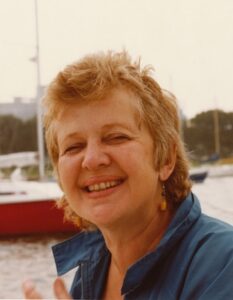
Aimee Isgrig Horton
*Aimee Isgrig Horton's birth is celebrated on this date in 1922. She was a white-American civil rights and education equality activist.
At a very early age, Aimee Isgrig, from Wisconsin, exhibited an avid interest in social change. She and her brother attended a non-traditional lab school at a teacher's college in Milwaukee, Wisconsin. The instructors had been educated in the John Dewey methods, and every student was encouraged to take an interest in the complex issues of the world. These issues were openly discussed, and Isgrig realized early on that solutions could be forthcoming through group interaction.
This environment was conducive to healthy social growth, and she quickly came to realize that the society in which she lived needed improvement. Isgrig attended a private prep school as a scholarship student, where there was no interest in social change. These provided her with an alternative perspective from which to view the world. Isgrig attended Rockford College in Rockford, Illinois, to do her undergraduate work in history. Rockford, at that time being a very "liberal" liberal arts college for women only, gave her the necessary tools to instill that change.
Isgrig had a very "do something" outlook and wished to make a positive impact on the world. While at Rockford, she attended classes in a Quaker Training Program, which catalyzed her continued passion for social improvement. Due to her experience, she was invited abroad by the United Nations to work with displaced persons in a refugee camp. With this experience, she interacted with them, recognized their own needs, and could also provide ideas for solutions. Rather than being an "educator" to the refugees, Isgrig had become part of their support system and viewed herself as the "student." This episode may have been her first true insight into what Adult Education is, the process of lifelong learning.
Isgrig continued her education at the University of Wisconsin, where she completed a master's degree in Adult Education. She then returned to the University of Chicago to pursue a doctorate in preparation for doing casework. Aimee went on to complete her doctoral work, in addition to writing her dissertation. She delayed this after investigating the opportunities in welfare and questioning whether casework could drive social change. Later, Isgrig worked with Highlander's Citizenship Schools, as well as training white students at Highlander, who then moved to Biloxi, Mississippi, to build support for SNCC, SCLC, and CORE during Freedom Summer.
Additionally, Isgrig wrote The Highlander Folk School: A History of Its Major Programs, 1932-1961. And she took Highlander's methodology of popular education with her when she returned to Chicago, founding the Lindeman Center, where the community worked together to develop grassroots solutions to its problems. In 1962, she married Myles Horton. In addition to being instrumental to the success of the Lindeman Center, she was an active educator and participant in the doctoral program at National-Louis University. According to Aimee, it's important to shape a program with the everyday concerns of the people in mind.
She admitted, however, that often in adult education, the educators still tend to say, "We know what people need to know." These two opposing ideas usually form a perpetual paradox. They must be constantly monitored. She was an inspiration to adult educators who strive to hold to these ideals and was a great example of adult education in action. Aimee Horton died on November 15 at St. Paul's House, 3800 North California in Chicago.